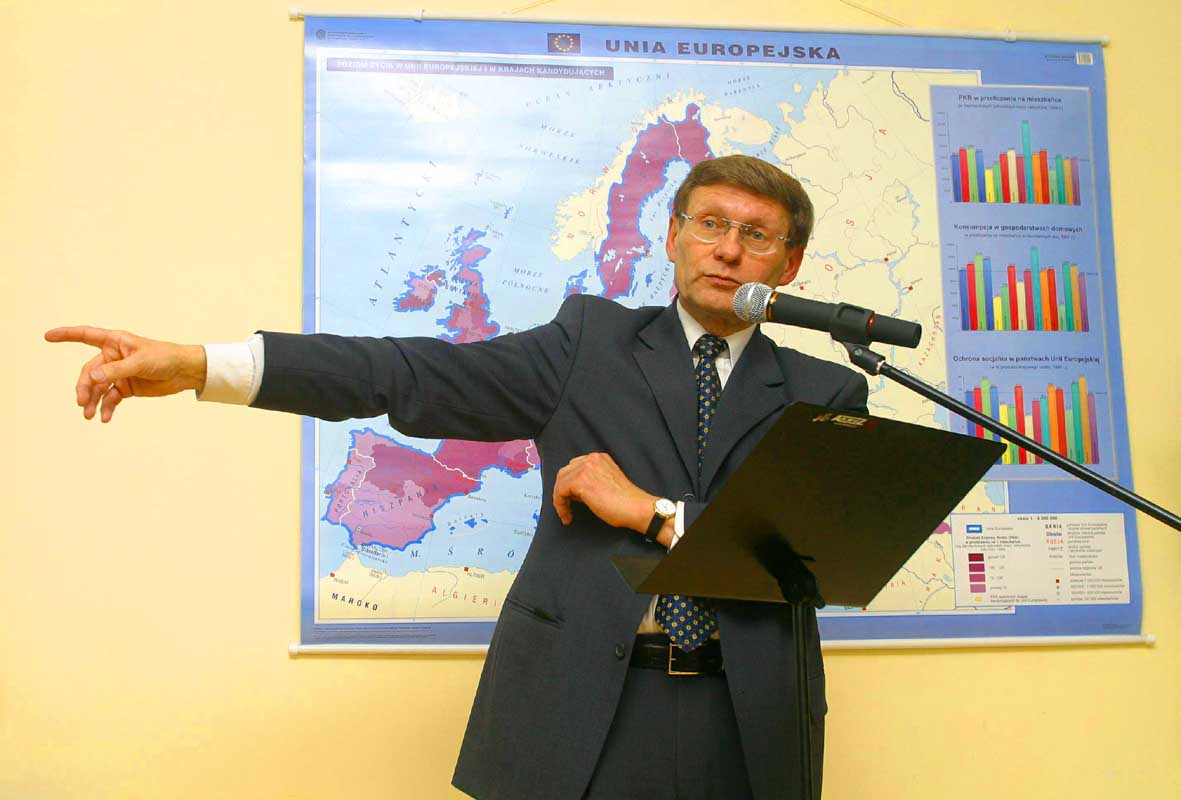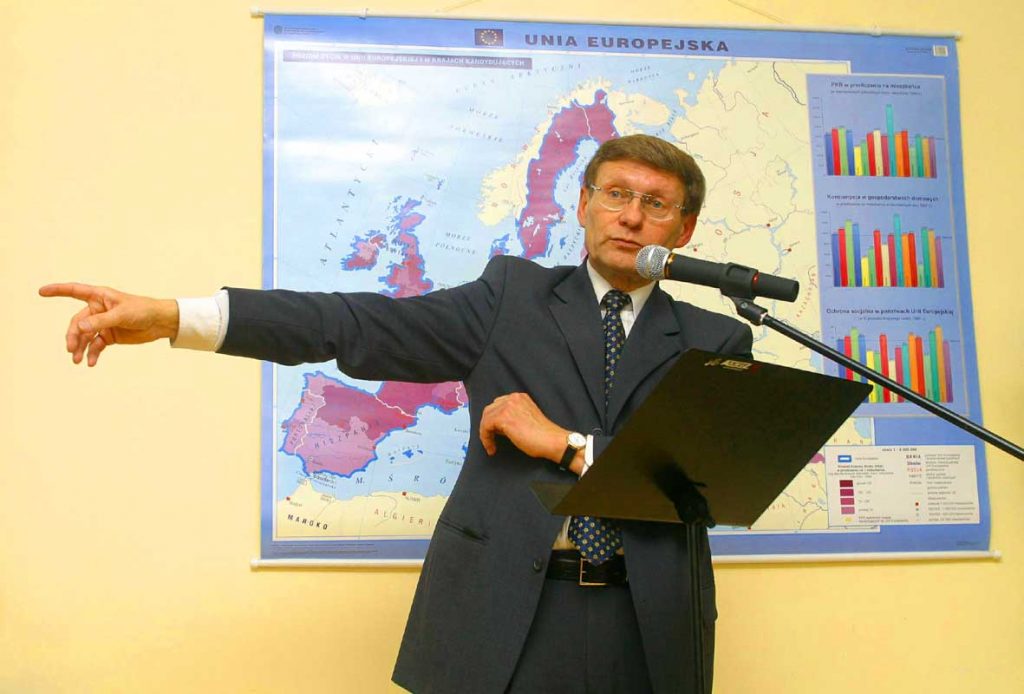
Veterans of Poland’s Economic Transformation Urge Ukraine to Clean Corruption ‘to the Bone’
Today Poland and Ukraine have closer relations than ever in their mutual history. Since the fall of communism, a historically adversarial relationship has evolved into a strategic partnership. Over the past decade, Polish statesmen such as Foreign Minister Radek Sikorski or former President Aleksander Kwasniewski have led international efforts to help resolve Ukraine’s various crises.
And as Ukraine’s newly elected President Petro Poroshenko begins working this week to pull his country out of bankruptcy and reverse the shriveling of its economy, it should follow the difficult but successful path that Poland used to transform a moribund communist economy into a growing, relatively prosperous economy. If it does, it has good prospects of succeeding, says Polish politician and diplomat Jacek Saryusz Wolski, who helped lead Poland’s shift toward integration with Europe two decades ago.
In 1990, when communism imploded in Eastern Europe, Poland and Ukraine were quite similar in economic and human potential. Poland’s per capita gross domestic product was $1,693, Ukraine’s was $1,569. Both countries suffered from typical side effects of communist economies – chronic shortages of goods, high inflation, corruption and very low living standards.
Poland knew that it wanted NATO and EU membership and began working towards both goals immediately. Within a decade, it had achieved an economic revival, while Ukraine became mired in ever deeper corruption, balancing between the West and Russia.
Poland’s Economic Miracle
Today Poland is one of the best performers in the EU with better economic growth figures than members of the so-called old Europe.
In 2012, according to the World Bank Poland’s per capita gross national income was $12,660 while Ukraine’s was only $3,500. How did Poland do it?
To begin with, Poland knew what it wanted. A unitary country with a high degree of national pride and awareness, Poland was determined to restore its nation to its rightful place in the heart of Europe.
And they had Leszek Balcerowicz, a finance minister who understood that before growth there had to be pain. Under his watch, the Polish government instituted a wide range of economic reforms from the very beginning. The new rules, called “shock therapy” freed prices on consumer products, drastically reduced government subsidies, created a convertible currency and encouraged foreign investment.
Balcerowicz: Poland’s Reform Czar
Liberalization, rapid stabilization and institutional change were at the heart of Balcerowicz’s shock therapy plan. The state’s role in the economy was reined in and individual freedom was expanded. Within two years hyperinflation was under control, price controls were ended, and shortages were a memory. The emerging private sector had no more socialist obstacles blocking its growth. Balcerowicz believed that market reform was all or nothing. A piecemeal approach would not be effective, the planned economy had to be broken and replaced by an open-market system based on private ownership.
As Balcerowicz’s plan allowed inefficient state industries to fail, unemployment rocketed to levels between 15 and 20 percent. But within less than five years, it began to drop, as private-sector growth took hold.
Following the pro-democracy, anti-corruption protests of Ukraine’s Maidan movement that toppled a corrupt government and led to this month’s election of businessman Petro Poroshenko as president, Ukraine has an opportunity to try similar reforms. One could say this is Ukraine’s Balcerowicz moment, and it’s now, or never.
Ukraine has signed the political part of its Association Agreement with the European Union, and is to sign the economic part this month. “My pen is ready,” Poroshenko announced during his inauguration.
Ukraine Opens Its European Path
If Ukraine completes the terms of that agreement, the European path will be open to it, said Saryusz Wolski said last weekend at the Atlantic Council’s Wroclaw Global Forum in Poland. As it was for his own country, Saryyusz Wolski told the audience, it will be painful for Ukraine. The country must get rid of its “bad habits”, the oligarchic state, and corrupt capitalism, he said at the forum, co-sponsored by the Atlantic Council.
Ukraine’s society must mature, politics must become transparent and the country must have an efficient administration – a process that should “begin with new parliamentary elections to kick out those members of parliament who were bought by oligarchs,” Saryusz Wolski said. The government in Kyiv “must eradicate corruption to the bone.”
Changing the country from within and aligning its structure and legislation with EU standards is a process that, after ten to fifteen years, will Europeanize Ukraine.
“I myself negotiated the Polish association [with the EU] and I am jealous – opening of the market, huge amount of money on the table — 11 billion euros. I would have dreamed as a Polish negotiator to get such good conditions, plus the takeover of European law and standards,” said Saryusz Wolski, now a member of the European Parliament. He noted that many Ukrainians lament the absence, in the Association Agreement, of a clear invitation for Ukraine eventually to join the European Union. Poland also received no such invitation at the outset, he recalled.
Ukraine’s chances for success are improved by a maturation of its society, Saryusz Wolski said, in the decade since the 2004 Orange Revolution, which failed to institutionalize broad reforms. His advice to Ukrainians: “go to work, come as close as possible to western-type democracy and market economy and do your homework and we – the West, Americans and Europeans – will do our utmost to help you.”
Leszek Balcerowicz, who went from the Polish Finance Ministry to head Poland’s National Bank, was in New York last month to receive the Milton Friedman Prize for Advancing Liberty from the Cato Institute. What Ukraine needs, he said then, is a cohesive team with a political mandate. Ukraine has many talented economists, he said, but they have never been given a chance to really affect change.
Perhaps with the election of its fifth president and a diligent populace fueled by the spirit of the Maidan revolution, those economists can finally get their chance.
Irena Chalupa covers Ukraine and Eastern Europe for the Atlantic Council.
Image: Polish economist Leszek Balcerowicz led his country's "shock therapy" reforms in the 1990s. He says Ukraine can make the same transformation. (CC License)
